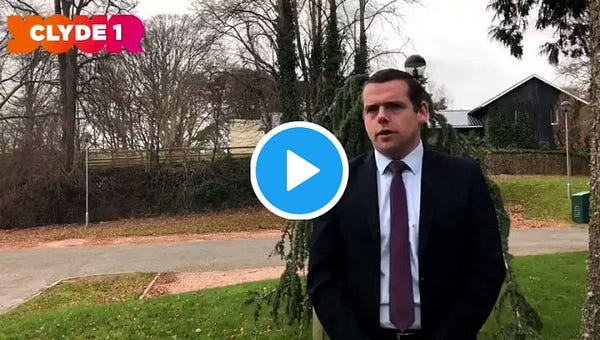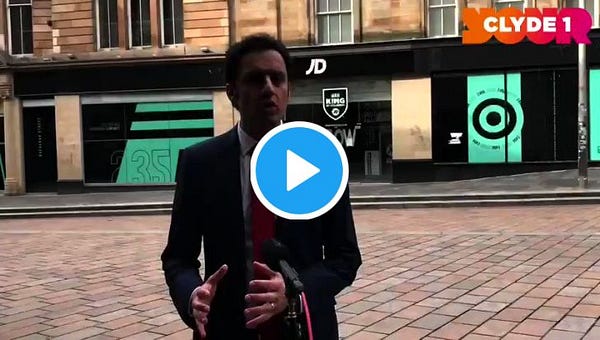Holyrood 2021: Day One
What have we learned from the first day's messages in the Holyrood elections?
This is a bonus edition looking at the first day of the Holyrood election campaign and what the parties opening messages tell us about their election strategy. If subscribers enjoy this, I’ll send these additional bits of analysis out whenever something catches my eye in the campaign. Maybe an election strategists’ view of what is going on behind the surface of campaigns might be interesting.
Nicola Sturgeon is on a Tightrope
Let’s start with Nicola Sturgeon’s opening message which can be summarised as ‘trust me to take the decisions that will lead us out of the pandemic and onto independence’.


As ever the First Minister is very polished but dissect her message and you can see the tightrope she has to walk in the next few weeks. Two things stand out.
Firstly, it is notable that she chooses not to talk about either the policy of independence or the process of achieving it through another referendum but rather talks more obliquely about the principle of it being her that takes the decisions about the recovery and not Boris Johnson. This is the fundamental weakness of the SNP in this election. All the parties will deliver a version of the same message about prioritising the recovery in this election, but she needs to tack onto the end of her version of this something which the vast majority of voters feel is a distraction from that recovery: her commitment to holding a referendum in the next two years.
This isn’t just an election problem for Nicola Sturgeon. Between now and polling day she knows that the more she talks about her plans for an urgent referendum, the less likely she is to win a majority for that. After polling day, any election victory won by continually parsing her words on the issue of leaving the UK will undermine her claim to hold a re-run of 2014.
The second shift in language from the First Minister is that the language has gone from talking about the election being a judgement on her past handling of coronavirus to focussing on decisions that have yet to be taken. I suspect this is because the First Minister knows that the SNP cannot go into an election asking to be rewarded for what has been, on any measure, a disaster for Scotland. We have one of the worst Covid death rates in the world, we have the scandal of care home deaths and we have had a government that mirrored all the key mistakes made by Boris Johnson. Sturgeon wants to exploit her poll ratings without stepping over the line into self-congratulation.
So the First Minister has a tricky time ahead of her. Can she mobilise the third of voters in her base by dog-whistling about another referendum without the swing voters who oppose an urgent vote hearing it? Can she ask for the endorsement of her leadership without that opening her up to scrutiny on her catastrophic covid record and her dismal delivery in public services?
Douglas Ross is Standing on a Trapdoor
Next, let’s look at the Conservatives. Watching Douglas Ross reminded me of the episode of the Simpsons where Homer heckles the band Bachman Turner Overdrive when they try to start their concert with some new material. Douglas Ross is clearly hoping that his audience has come to hear the classic hits because his message is the one we have heard at every election since 2014: we are the only ones who can stop the SNP from holding another referendum.


As in previous elections, this message is combined with the usual attempt to claim that Labour aren’t really against independence, a message that relies on voters forgetting that it was Anas Sarwar, alongside Alistair Darling and Gordon Brown who lead the pro-Union cause to victory in 2014. They have complained that Labour is attacking the Tories as well as the SNP in this election, which is, of course, an attack on Labour and not the SNP from the Tories.
The Conservative message has been successful before, and it might be this time. At the very least it may create enough friction to force Nicola Sturgeon to move beyond her euphemistic language on independence. In previous elections the SNP and Conservatives have been in a kind of electoral symbiosis – they are the villains each other need in order the land their own message and, importantly for both of them, to overshadow Labour’s attempts to talk about more boring things like teaching kids to read, giving people jobs or curing the sick.
Douglas Ross is standing on a trapdoor with this message however. Just last month Boris Johnson said this:
"Quite frankly I do not see the virtue, value or utility of having a referendum at any time in the foreseeable future”
Why do people need to vote conservative to rule out another referendum when Boris Jonson has already done that? Can we not trust the Prime Minister on the Union? This is why the Conservative message, while effective in direct mail and on the doorstep with a core pro-Union vote, might not survice the first in-depth TV interview of the campaign.
Anas Sarwar is on a Mission
The Labour leader’s message is clear but more subtle than his pro-UK counterparts on the right:
“Voters across Scotland face a choice over the next six weeks about whether we focus on what unites us not what divides us. Whether we focus on recovery or go back to the old arguments.”


To get a good result, and to make any progress in moving Scotland on from the dead-end of constitutional rows, Sarwar must do two things. He has to stop the recent bleeding to the Tories from former Labour voters who want to remain in the UK and he has to reach some of those who have voted SNP but don’t want independence any time soon.
He wisely chooses to define against the headache of the process of another referendum, “the old arguments”, rather than the outcome of independence. In doing this he is seeking to define against both his main opponents by telling the truth about them: their strategy depends on keeping this tired constitutional fight going. He is seeking a wider coalition than simply cannibalising core pro-Union voters. Ultimately, converting undecideds on the constitution who vote SNP is the only way the establishment in Scotland will be beaten.
The last few Labour leaders have struggled to find a language and tone that allowed us to talk about the world of politics beyond whether or not to leave the UK. The post-pandemic recovery is offering Anas an opportunity to tell a story about a new Scottish politics in a hopeful way, rather than only being a voice for angry opposition to the SNP. I’ve written previously about how the post-covid recovery offers the kind of fresh start moment, the chance to leave behind the things that you’ve had enough of. That has been one of the appeals of leaving the UK, Anas is finding a way to offer it without the cuts and chaos of Scexit.
Importantly the Labour message is also making a virtue of the deeper values of the pro-Union case: unity and togetherness over division and conflict. Labour has lost that in recent years and became too defined by our opposition to the SNP rather than offering an alternative story for Scotland. Sarwar is clearly on a mission to break the frame of nationalist Scotland, and he understands that you don’t break your opponent’s frame by constantly repeating it. You need to tell a different, more compelling story.
That is what makes Sarwar’s message distinct from that of Ross: Sarwar wants to turn people away from nationalism, Ross wants to fight nationalists. If Scotland is ever going to have real politics again, the former is far more important than the latter.
We know from the polls that the voters agree with Anas that there are far more important things to focus on than the old argument. Will he be able to burst the bubble of Scottish politics and offer that change?
Willie Rennie is on a Deckchair
It’s election time.




